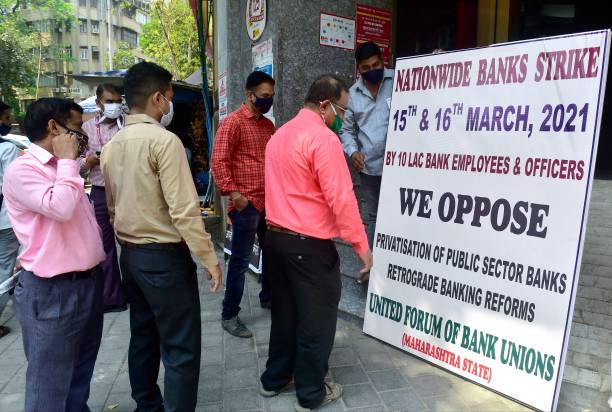16 Mar , 2021 By : kanchan Joshi

The employees belonging to nine public sector banking unions have gone on a two-day strike against privatization. Given that the banks were already closed for the weekend, this means many people wouldn’t have had access to branch banking services for four days at a stretch.
In her budget speech, finance minister Nirmala Sitharaman had proposed to privatize two public sector banks (PSBs). Over and above this, the government also had plans to privatize IDBI Bank, which is now majority-owned by the Life Insurance Corp. of India, and hence, is categorized as a private sector bank.
Not surprisingly, the bank unions are opposing privatization, given that it is one thing to be an employee of a government-run institution, where a job lasts for a lifetime and totally another thing being an employee of a private institution. But the fact of the matter is that irrespective of what the banking unions may choose to do or not, banking as a sector is already getting privatized, like airlines and telecom before it.
Take a look at the following graph. It plots the loans given by PSBs as a proportion of total lending carried out by Indian banks (which other than PSBs includes private sector banks, foreign banks, regional rural banks and small finance banks) over the last 15 years.
As can be seen from the chart, the lending by PSBs as a proportion of overall lending peaked in March 2010, at 75.12%. The PSBs controlled more than three-fourth of the lending carried out by Indian banks. Since then, the lending carried out by PSBs as a proportion of overall lending has been gradually coming down, and as of September 2020, the latest data available, it had stood at 57.31%.
In March 2010, the private sector banks carried out 17.44% of the overall bank lending in India. As of September 2020, it had more or less doubled to 35.03%. Clearly, the lending business that has been lost by PSBs has been taken over by the private sector banks.
How are things on the deposits front? Let’s take a look at the following chart. It plots the proportion of banking deposits that have been with the PSBs over the last 15years.
The proportion of banking deposits with PSBs in the considered time period reached a high of 74.76% in March 2012. Since then, the proportion has been going down and stood at 62.18% as of September 2020.
In the last few years, this has slightly levelled off due to the fact that a few private banks such as Yes Bank have been in trouble. Hence, a certain proportion of the population still trusts PSBs more when it comes to deposits. During the same period, the proportion of deposits with private banks has gone up from 17.85% as of March 2012 to 29.10% as of September 2020.
To cut a long story short, irrespective of whatever PSB unions might think, the banking sector is getting increasingly privatized, and a bulk of this privatization has happened in the past five years, as PSBs have struggled with a huge amount of bad loans or loans which haven’t been repaid for a period of 90 days or more.
There is nothing to suggest that this trend is going to slow down in the years to come. Of course, this is not something that the union members are worried about. They are worried about their public sector jobs and hope that they continue to have them until they retire.
As far as the government is concerned, it finally seems to have come around to the idea that the longer it continues to hold on to some of these banks, the more value destruction is going to happen. Also, there doesn’t seem to be much confidence in the idea of letting PSBs be run as proper banks instead of using them for other purposes like meeting the social objectives of the government or pump-priming the economy in troubled times.
Anyway, over the years, trillions of rupees have been poured into PSBs to keep them going. This is money which could have easily gone to other sectors like education, health, agriculture etc.
And if things don’t change soon, the government is going to end up with the MTNL and Air India of banking. For all we know, things might be already be too late on the PSB privatization front. But then the government needs to at least try selling some of these banks.
0 Comment